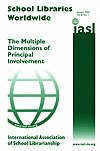"Despite these encouraging programs, [ones in which information on the role of the teacher-librarian be included in the training of pre-service teachers], it is apparent that most teacher-training institutions are not preparing new teachers to work collaboratively with the teacher-librarian. It may be that school-based teacher-librarians, workers in the field, as it were, will have to take the initiative and approach their closest Faculty of Education. We will need to initiate some liaison between teacher-librarians and the Department of Education at our local community college. We need to build a power base from which to influence the training of teachers and administrators—and of future school librarians (Hartzell, 1997).
"Rather than waiting passively, in the bottom half of a top-down model, for the arrival of new teachers fully cognizant of the role of the teacher-librarian, we need to be part of a continual loop; a reciprocal give and take of information and support between the Faculty of Education which is training the new teachers and the school system which is receiving them."


